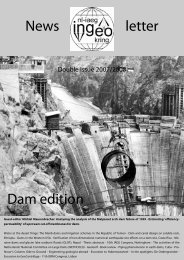environment
environment
environment
- No tags were found...
You also want an ePaper? Increase the reach of your titles
YUMPU automatically turns print PDFs into web optimized ePapers that Google loves.
Vol. 11 No. 1 2004<br />
PROFESSOR’S COLUMN<br />
"Geological Engineering" or "Engineering Geology"<br />
- What is in a Name?<br />
Professor A. Keith Turner<br />
Department of Geology and Geological Engineering<br />
Colorado School of Mines<br />
Golden, Colorado 80401 USA<br />
At first glance the terms “geological engineer” and<br />
“engineering geologist” appear synonymous. Because<br />
the two terms employ essentially the same two words –<br />
“geology” and “engineering” – although in reverse<br />
order, the opportunity for confusion is great. The word<br />
choices may be unfortunate, but the two terms represent<br />
distinct, although related, concepts concerning<br />
educational and professional endeavors. Both have<br />
developed in response to the complexity of modern<br />
engineering design, especially those designs involving<br />
the interface between naturally occurring earth materials<br />
and the engineered structure, or the use of naturally<br />
occurring materials within the constructed facility.<br />
Geological Engineering<br />
In the early 20 th Century, advances in both technology<br />
and engineering made larger and more complex<br />
engineering works feasible. New branches of<br />
engineering – such as petroleum engineering –<br />
developed in response to technological advances.<br />
Existing engineering disciplines – such as civil<br />
engineering – increased demands for new specialties to<br />
design ever larger and more complex bridges, dams,<br />
tunnels, for water-supply and transportation systems.<br />
The minerals and petroleum industries also required<br />
increasing numbers of exploration and production<br />
specialists and administrators – roles for which<br />
engineering training combined with geological<br />
knowledge was the basic requirement.<br />
Consequently, a number of universities and mining<br />
schools in the western United States began to offer<br />
engineering programs leading to a degree in “Geological<br />
Engineering.” Graduates from these programs were<br />
hired by petroleum and minerals exploration and<br />
production companies, and placed in positions where<br />
their combined geological and engineering training made<br />
them uniquely qualified. Subsequently, as professional<br />
engineering registration procedures became codified,<br />
these geological engineering programs became<br />
accredited – allowing their graduates to later achieve<br />
the status of Professional Engineer (PE). Geological<br />
engineers that obtained PE status could legally approve<br />
designs for engineering works, an important<br />
consideration in some situations. The term “Geological<br />
Engineer” thus developed in the United States in<br />
response to both technological demands and to legal<br />
professional engineering registration procedures. A<br />
geological engineer is trained as an engineer – but an<br />
engineer with a broad understanding of applied<br />
geological science.<br />
Most of the early geological engineers did not work on<br />
civil engineering projects. They were more likely to<br />
work on minerals exploration and exploitation projects<br />
with mining engineers, or on petroleum exploration and<br />
production projects with petroleum engineers. Only in<br />
the latter half of the 20 th Century, when major civil<br />
engineering projects following World War II placed new<br />
demands for specialists to work with civil engineers,<br />
did many North American universities begin to provide<br />
“options” within their academic programs – usually<br />
three, with titles such as “Petroleum Exploration”,<br />
“Minerals Exploration” and “Engineering Geology.”<br />
Thus developed the confusing situation of some<br />
“Geological Engineers” undertaking programs of study<br />
in “Engineering Geology.”<br />
Engineering Geology<br />
In contrast to the geological engineer, the engineering<br />
geologist remains first of all a geoscientist – albeit a<br />
rather applied geologist. Engineering geology uses<br />
geology to create more efficient and effective<br />
engineering works, to assess and allay <strong>environment</strong>al<br />
concerns, and to promote the public health, safety, and<br />
welfare. Geologists have advised on engineering works<br />
from the earliest days of geology investigations; the<br />
evolution of relationships between civil engineering and<br />
geology forms an interesting historical study.<br />
The term “engineering geology” became widely<br />
accepted only as the demand for geological specialists<br />
to advise civil engineers developed in the last half of<br />
the 20 th Century. Several universities in both the USA<br />
and Canada established “Engineering Geology” options<br />
within science-oriented geological programs. Graduates<br />
who chose to work with civil engineers adopted the<br />
title “Engineering Geologist.” Many Canadian<br />
university geology departments either partially or entirely<br />
joined the faculties of applied science (in other words –<br />
engineering). This allowed many, if not all, of their<br />
graduates to achieve registration as professional<br />
engineers, and many individuals did so. In contrast,<br />
within the USA, graduates from these science-oriented<br />
49




